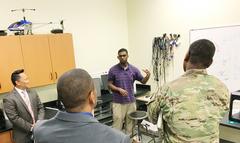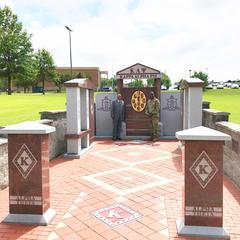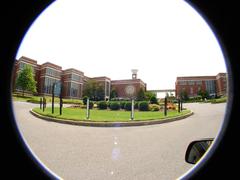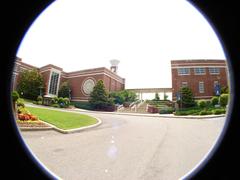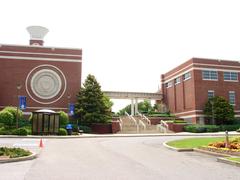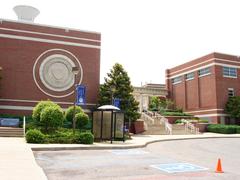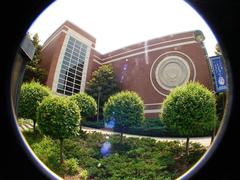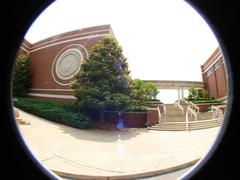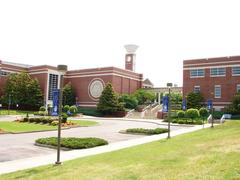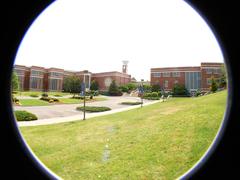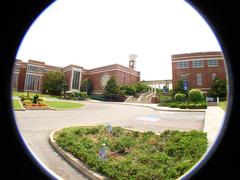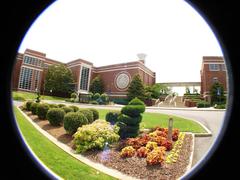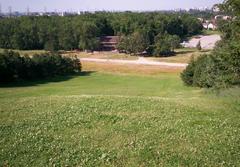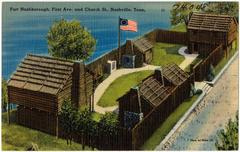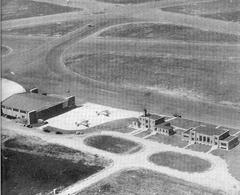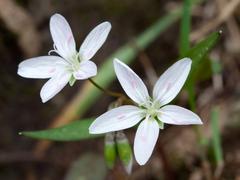
Tennessee State University Visiting Guide — Nashville, United States
Date: 14/06/2025
Introduction to Tennessee State University: History and Significance
Tennessee State University (TSU) is a cornerstone of higher education, cultural heritage, and civil rights legacy in Nashville, Tennessee. Founded in 1912 as the Tennessee Agricultural & Industrial State Normal School for Negroes, TSU has evolved into a leading historically Black university (HBCU), renowned for academic excellence and its pivotal role in the advancement of civil rights. The campus, spanning 500 acres near downtown Nashville, features a blend of historic architecture and modern research centers, including several buildings on the National Register of Historic Places and the iconic Tennessee State University Monument (TSU History, Wikipedia).
TSU welcomes a diverse audience—prospective students, history buffs, and travelers eager to experience Nashville’s educational and cultural landscape. This guide offers detailed information on visiting hours, tours, event tickets, and accessibility, ensuring an inclusive experience for all guests (TSU Fast Facts). Its central location provides easy access to Nashville’s famed attractions, such as Centennial Park, the Parthenon, and the city’s music districts, making TSU a vibrant destination year-round (TSU Visit, Nomadic Matt).
The Tennessee State University Monument, a public landmark on campus, commemorates TSU’s profound impact on education and social justice, offering daily access, guided tours, and special cultural programs (TSU Monument Visitor Guide). This guide equips you with essential details and practical tips to make your TSU visit both memorable and meaningful.
Contents
- Welcome to Tennessee State University: A Hub of History and Culture in Nashville
- Founding and Early Development
- Growth, Accreditation, and Academic Expansion
- Transition to University Status and Integration
- Civil Rights Legacy and Community Impact
- Notable Alumni and Achievements
- Research, Innovation, and Academic Excellence
- Campus, Facilities, and Recent Investments
- Visiting Tennessee State University: Hours, Tours, and Tickets
- Athletics and Student Life
- Governance and Recent Developments
- Accessibility and Visitor Support
- Frequently Asked Questions (FAQ)
- Discover the Tennessee State University Monument: Visitor’s Guide
- Tennessee State University Visiting Hours, Tickets, and Exploring Nashville Historical Sites
- Campus Visitor Experience
- Exploring Nashville Historical Sites and Attractions Near TSU
- Summary and Final Tips
Welcome to Tennessee State University: A Hub of History and Culture in Nashville
TSU stands as a beacon of opportunity, cultural pride, and academic achievement. Whether you’re a prospective student seeking inspiration, a history enthusiast, or a traveler exploring Nashville, this guide provides a comprehensive overview, from TSU’s rich legacy to practical advice for planning your visit.
Founding and Early Development
TSU was established in 1912 to provide teacher training and agricultural education to African American students in Tennessee (TSU History). The school was dedicated on January 16, 1913, and soon expanded its mission, becoming Tennessee Agricultural & Industrial State College in 1927 (Wikipedia). This early growth reflected national movements to advance educational access for Black Americans.
Growth, Accreditation, and Academic Expansion
The 1940s and 1950s marked significant milestones. TSU began awarding master’s degrees in 1944, following a 1941 directive by the Tennessee General Assembly. Achieving full accreditation in 1946, TSU flourished under President Walter S. Davis, with major campus expansion during his tenure (TSU Fast Facts).
Transition to University Status and Integration
TSU gained university status in 1968, reflecting its broadened academic mission (Wikipedia). In 1979, the University of Tennessee at Nashville merged into TSU, making it Nashville’s sole public four-year university (Nashville History).
Civil Rights Legacy and Community Impact
TSU students were leaders in the Civil Rights Movement, participating in Nashville’s historic sit-ins and protests. The university continues this legacy through annual events such as the Nashville Conference on African American History and Culture, now in its 44th year (NCAAHC Event).
Notable Alumni and Achievements
TSU boasts a distinguished alumni network, including Oprah Winfrey and Olympic champion Wilma Rudolph. The university has produced numerous Olympians, thought leaders, and professionals across diverse fields, inspiring new generations of students (TSU Fast Facts).
Research, Innovation, and Academic Excellence
Today, TSU is classified as an “R2: Doctoral Universities – High research activity” institution, offering 41 bachelor’s, 23 master’s, and eight doctoral programs. Key research strengths include biotechnology, homeland security, and agriculture. Recent academic additions, such as the master’s in Data Science (launching Fall 2025), demonstrate TSU’s commitment to future-ready education (TSU Fast Facts, TSU News).
Campus, Facilities, and Recent Investments
The main 500-acre campus is situated near downtown Nashville, complemented by the Avon Williams campus, which houses graduate programs and community events (TSU Visit). A landmark $250 million state investment in 2022 is transforming facilities and programs, ensuring a modern, student-centered environment (Wikipedia).
Visiting Tennessee State University: Hours, Tours, and Tickets
TSU welcomes visitors year-round:
- Campus Hours: Monday–Friday, 8:00 AM–6:00 PM; Saturday, 9:00 AM–1:00 PM.
- Guided Tours: Available Monday–Friday by appointment. Book via the TSU Admissions Visit page.
- Entry: Campus visits are free. Tickets may be required for athletic events and special programs. Check the TSU Athletics website for details.
- Best Times: Spring and fall feature pleasant weather and vibrant campus activity.
- Virtual Tours: Interactive online tours are available through the official TSU website.
Athletics and Student Life
TSU competes in NCAA Division I (Ohio Valley Conference), with popular sports such as football, basketball, and track and field (TSU Athletics). More than 60 student clubs and organizations foster leadership, service, and campus engagement (TSU Fast Facts).
Governance and Recent Developments
In March 2024, the university’s board of trustees was updated to enhance leadership and support continued growth (Wikipedia).
Accessibility and Visitor Support
TSU is designated as a “Military Friendly” and “Vets Campus,” providing comprehensive resources for veterans and their families. The campus is ADA-compliant, offering accessible entrances, restrooms, parking, and support services (TSU Fast Facts).
Frequently Asked Questions (FAQ)
-
Q: What are TSU’s visiting hours?
A: Monday–Friday, 8:00 AM–6:00 PM; Saturday, 9:00 AM–1:00 PM. -
Q: Is there an admission fee?
A: No, general campus visits are free. Special event tickets may be required. -
Q: Are guided tours available?
A: Yes, by appointment via the TSU Admissions Visit page. -
Q: Is TSU accessible for disabled visitors?
A: Yes, with accommodations available campus-wide. -
Q: How do I attend the Annual Nashville Conference on African American History and Culture?
A: Visit the event website or TSU events page.
Discover the Tennessee State University Monument: Visitor’s Guide
About the Monument
Located at 3500 John A. Merritt Blvd., the TSU Monument honors the university’s enduring legacy in education and civil rights. Inscriptions and sculptures highlight pivotal moments and notable alumni.
Visiting Details
- Hours: Daily, 8:00 AM–6:00 PM.
- Admission: Free; guided tours and special programs may require registration (TSU Monument Visitor Guide).
- Tours: Led by knowledgeable docents, tours last 45–60 minutes and cover the monument and nearby campus landmarks.
- Events: The monument hosts Founders’ Day, Black History Month, and alumni gatherings.
- Photos: Prime spots include the main plaza and historic campus backdrops—best during sunrise or sunset.
- Accessibility: Fully ADA-compliant.
- Nearby Amenities: Campus dining, retail shops, and seating areas.
National Civil Rights Museum — Memphis, Tennessee
Overview
Located at the Lorraine Motel, the National Civil Rights Museum chronicles the American civil rights movement and marks where Dr. Martin Luther King Jr. was assassinated in 1968 (official National Civil Rights Museum website).
Visitor Information
- Hours: Tuesday–Sunday, 9:00 AM–5:00 PM; closed Mondays and holidays.
- Tickets: Adults $17, Seniors $15, Students $12, Children (6–17) $8, under 6 free. Purchase online or at the entrance.
Highlights
- Preserved Room 306, exhibits on key civil rights events, interactive displays, and personal testimonies.
- Guided tours, educational workshops, and special events throughout the year.
- Fully accessible facility with a gift shop and café.
- Downtown Memphis location near Beale Street and other attractions.
- Parking and public transit available.
Tennessee State University Visiting Hours, Tickets, and Exploring Nashville Historical Sites
TSU Campus Visitor Experience
- Hours: Monday–Friday, 8:00 AM–6:00 PM; Saturday, 9:00 AM–1:00 PM (TSU Visit website).
- Tours: Free, 60–90 minutes by advance registration.
- Athletic & Special Events: Ticket info at TSU Athletics.
- Landmarks: Goodwill Manor, seven National Register buildings, TSU Tiger statue, green spaces, and Avon Williams Campus (Tennessee Encyclopedia, Britannica).
- Athletics: NCAA Division I, OVC; Gentry Center hosts major events.
- Accessibility: Most buildings are ADA-compliant; accommodations via TSU Office of Disability Services.
- Visitor Tips: Parking permits required; public transit and rideshare are available. Prepare for warm June weather (Travellers Worldwide).
Exploring Nashville Historical Sites Near TSU
- Centennial Park & Parthenon: 3 miles from TSU, art museum and festivals (Nomadic Matt).
- Music Districts: Honky Tonk Highway, Country Music Hall of Fame, Ryman Auditorium.
- Events in June: Pride Festival, Juneteenth, citywide music and arts festivals (All Events in Nashville, Nashville Events).
- Dining: Southern cuisine in Germantown, The Gulch, East Nashville (Travellers Worldwide).
- Transportation: WeGo Public Transit, Uber/Lyft, pedestrian-friendly downtown.
- Accommodations: Nearby hotels, downtown options—book early for events (Nomadic Matt).
- Safety: Standard precautions; Visitor Center downtown offers assistance.
Summary of Key Visitor Information and Final Tips
TSU offers a unique blend of tradition, innovation, and community engagement. The historic campus, supported by major investments, invites visitors to experience academic, cultural, and social justice milestones (TSU Fast Facts, Wikipedia). The TSU Monument is a must-see, accessible year-round with enriching tours and events (TSU Monument Visitor Guide). Proximity to Nashville’s top attractions makes TSU an essential stop for any city itinerary (TSU Visit).
Tips for Your Visit:
- Book tours in advance.
- Check event calendars for athletic and cultural happenings.
- Use resources like the Audiala app for virtual tours and updates.
- Prepare for Nashville’s climate and enjoy the nearby cultural scene.
Ready to explore TSU and Nashville?
Download the Audiala app for personalized guides, event notifications, and local tips. Follow TSU and Audiala on social media for the latest updates.
For more information, visit official TSU resources:
TSU Visit, TSU Athletics, TSU Disability Services.
Sources and Official Links
- TSU History
- Tennessee State University - Wikipedia
- TSU Fast Facts
- Nashville History: Tennessee State University
- 2025 Nashville Conference on African American History & Culture
- TSU News
- TSU Visit
- TSU Monument Visitor Guide
- TSU Campus Visit Info
- TSU Athletics
- TSU Disability Services
- Nomadic Matt’s Nashville Itinerary
- Tennessee Encyclopedia: TSU
- Britannica: TSU
- Travellers Worldwide: Tennessee
- All Events in Nashville - June
- Nashville Events - June
- National Civil Rights Museum





